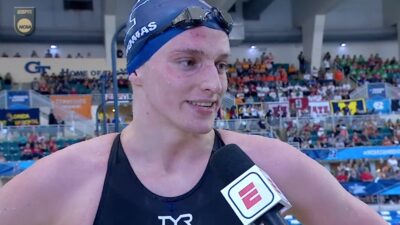
One of the biggest sports stories — and simultaneously least publicized sports stories — has to do with UPenn’s women’s swimming team.
Penn’s women’s swimming team has received attention because they have a transgender swimmer on the team, Lia Thomas. Thomas is competing for the women’s team and is absolutely obliterating school and Ivy League records. She has been swimming on the women’s team this season despite previously competing on the men’s swimming team for three years during her college career. She last swam on the men’s team as Will Thomas in 2019. She was even a second-team all conference swimmer as Will Thomas but two seasons later is swimming on the women’s team and dominating.
The parents of Thomas’ teammates are fed up with how ridiculous and unfair the whole situation is. They sent an angry letter to the NCAA calling for the organization to create some fair boundaries.
“At stake here is the integrity of women’s sports,” they wrote in the letter, according to DailyMail.com. “The precedent being set – one in which women do not have a protected and equitable space to compete – is a direct threat to female athletes in every sport. What are the boundaries? How is this in line with the NCAA’s commitment to providing a fair environment for student-athletes?
“It is the responsibility of the NCAA to address the matter with an official statement. As the governing body, it is unfair and irresponsible to leave the onus on Lia, Lia’s teammates, Lia’s coaches, UPenn athletics and the Ivy League. And it is unfair and irresponsible to Lia to allow the media to dictate the narrative without the participation of the NCAA,” the letter states.
The letter was sent on Dec. 5 and the parents have not yet received a response, according to the Daily Mail.
The letter was sent by about 10 parents, the Daily Mail says.
“The NCAA obviously didn’t think much about the rules they set,’ one parent told the Daily Mail. ‘It’s not fair to the women on the team and it’s not fair to Lia as well. She went through transition, and I admire her bravery. But the records she sets now are not valued records, female records.”
The NCAA’s current rules say that a transgender woman can compete on the women’s team after undergoing hormonal therapy for a year.
Given Thomas’ dominance on the women’s team, it’s clear the NCAA’s rules and policies are ineffective and have disrupted the level playing field.
Just looking at Thomas’ times when competing as Will and Lia, compared to the NCAA women’s record times, shows you how unfair the situation is:
WILL
200m free
1:39:31
500m free
4:18:72
1650m free
14:54:76
LIA
200m free
1:41:93
500m free
4:34:06
1650m free
15:59:71
NCAA WOMEN’S RECORD TIMES
200m Free
1:39:10
500m free
4:24:06
1650m free
15:03:31
The NCAA women’s record times were set by Olympic gold medalists.
Penn sent a response to the parents, telling them that they were essentially standing behind Thomas and offering resources for the students to deal with any mental troubles that have arisen from the situation.
According to the Daily Mail, some of Penn’s swimmers were bothered by the perceived arrogance displayed by Thomas after she won a recent Zippy Invitational competition by 38 seconds. She said things such as she was “cruising” and suggested that even though she wasn’t at her best, it’s OK because she’s still the No. 1 swimmer in the country.
Anonymous members of Penn’s women’s team told OutKick they have been told to avoid speaking with the media and that the support teammates have given Thomas is fake.
The NCAA needs to address the situation because it’s obvious how poor and ineffective their policies are.
Women’s sports divisions were created because of the acknowledgment that the top male athletes have biological advantages that make them superior to top female athletes in the same sports/events. Women compete against women so that they have a level playing field in competition. Allowing someone who was born as a male, went through puberty as a male, and had the biological male advantages up until two years ago, to compete as a female, is unfair, and the proof is in the results. It’s clear that just requiring one year of hormonal therapy is not enough to put a transgender female athlete on an equal level to other female athletes.
The NCAA needs to stop burying its head in the sand, respond to the parents, acknowledge the unfairness of the situation, and make a rule change. Some policy makers have discussed rules limiting athletes to compete only as the gender they were born. Others have suggested once an NCAA athlete competes in a sport in one gender, they should not be allowed to compete as another gender. Maybe the NCAA is considering some other possible changes to restore the level playing field for female athletes.













